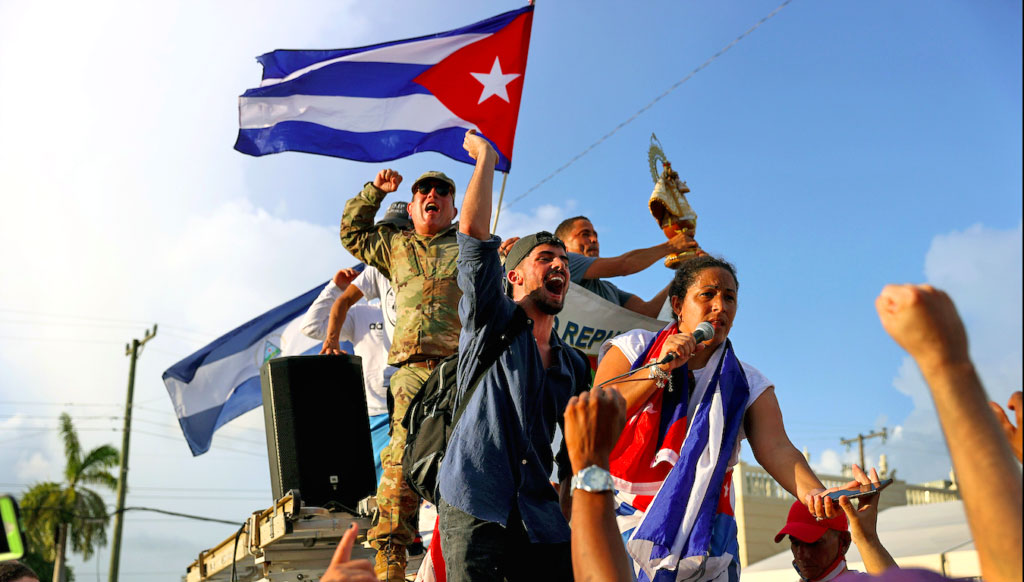On Sunday afternoon, while having lunch with my best friend, I saw on Twitter that protests were occurring all over Miami. I’d been privy to the unrest in Cuba over the lack of vaccines — or so the mainstream media was saying — but until people hit the streets in Miami, I didn’t pay much attention to what happens on the island. As a first-generation American and a child of Cuban exiles, Cuba’s political situation has always been a spectre floating on the periphery of my life. Whenever a situation on the island reverberates in Miami and the city unleashes its pent-up energy, I’m reminded that, to many Cuban-Americans, their homeland isn’t merely a ghost that haunts them on occasion but the place they never left — they’re not haunted, but possessed.
It’s difficult to explain to a non-Miamian what the city feels like in these moments when the possibility, no matter how slight, of a free Cuba materialises. This was the case on November 25, 2016, when dictator Fidel Castro finally died and the city erupted with Cubans and non-Cubans alike taking to the streets in a celebration that resembled an exorcism. It was a beautiful, joyous moment, and like all things Cuban, tinged with sadness. The tyrant was dead, yes, but so many were also thinking of all those abuelos and abuelas and tias and primos who didn’t live to see the day.
The Elian Gonzalez custody battle, which erupted after the 5-year-old was found drifting on a raft three miles off the coast of America, had a similar kind of effect. This was an extended saga that drew Cuba and its Florida exiles into conflict for months, producing some of the most iconic images of Cuban-American Miami to date. It was the first time Americans really understood that the Miami-Cuba link was an unbreakable political — and emotional — bond, made all the more tragic by the island’s proximity to Miami.
Home was always so close, yet so far, and Elian the miracle boy — guided to Miami by dolphins after his raft capsized, as legend has it — became a symbol for all that had been lost. He was sent back to Cuba and the city broke out in protest, yet another separation and loss for the exile community. I remember being woken up by mother, saying, “Se lo llevaron” — “They took him”. What had been taken, of course, wasn’t just the boy, but the possibility of a new — triumphant — story for the Cubans of Miami.
Once again, the linkage between Cuba and Miami is making international news. It feels different, I keep hearing around town. When Castro died, Miami Cubans celebrated the death of a tyrant who’d destroyed their lives, but anyone with any sense knew that the dictatorship wasn’t yet on its last legs. This time, Cubans on the island had taken to the streets first and, for once, it didn’t feel like the Miami Cubans were the driving force behind the moment. In fact, the Miami Cubans were caught off-guard by what was happening.
The Cubans on the island, finally pushed to the edge due to the worst economic crisis in decades, have taken to the streets in an unprecedented call for freedom and libertad, while the exiles in Miami, in numbers I haven’t seen before, have followed suit. Now there is — just maybe — a possibility of actual change on the island, after 60 years of dictatorship.











Join the discussion
Join like minded readers that support our journalism by becoming a paid subscriber
To join the discussion in the comments, become a paid subscriber.
Join like minded readers that support our journalism, read unlimited articles and enjoy other subscriber-only benefits.
Subscribe